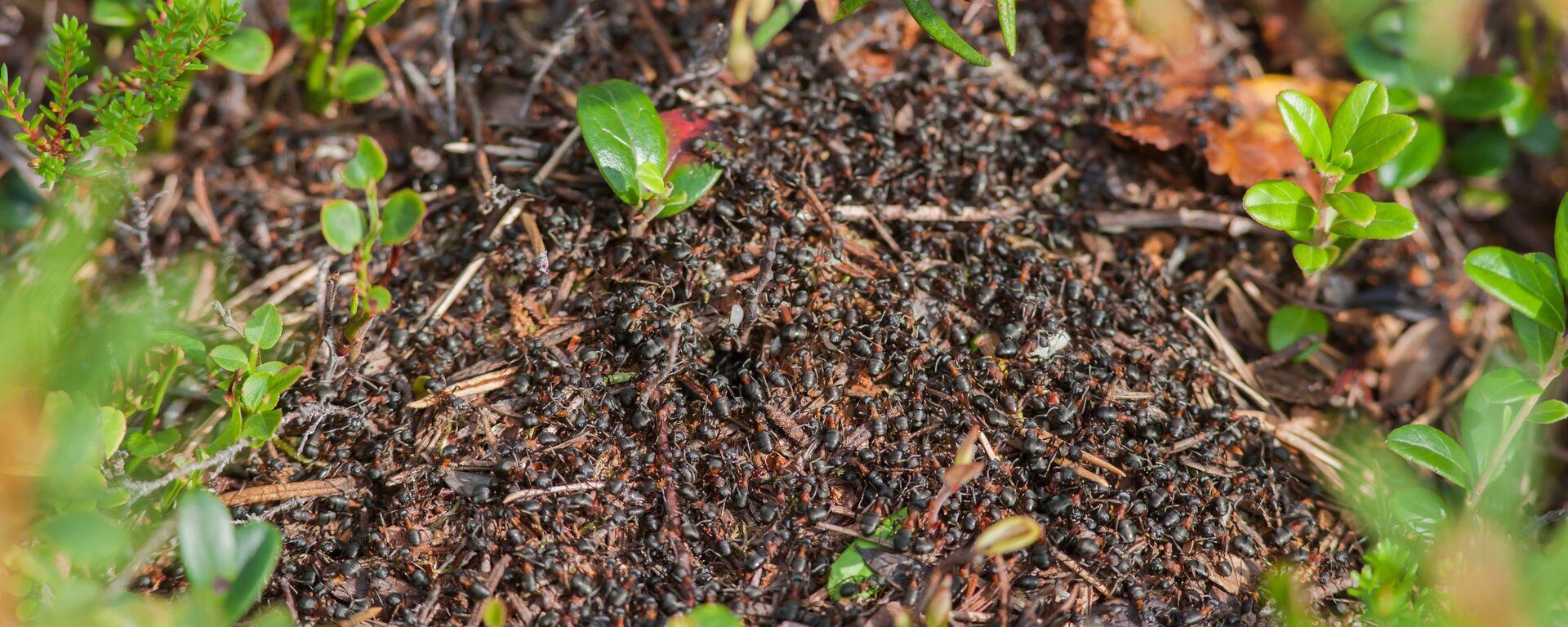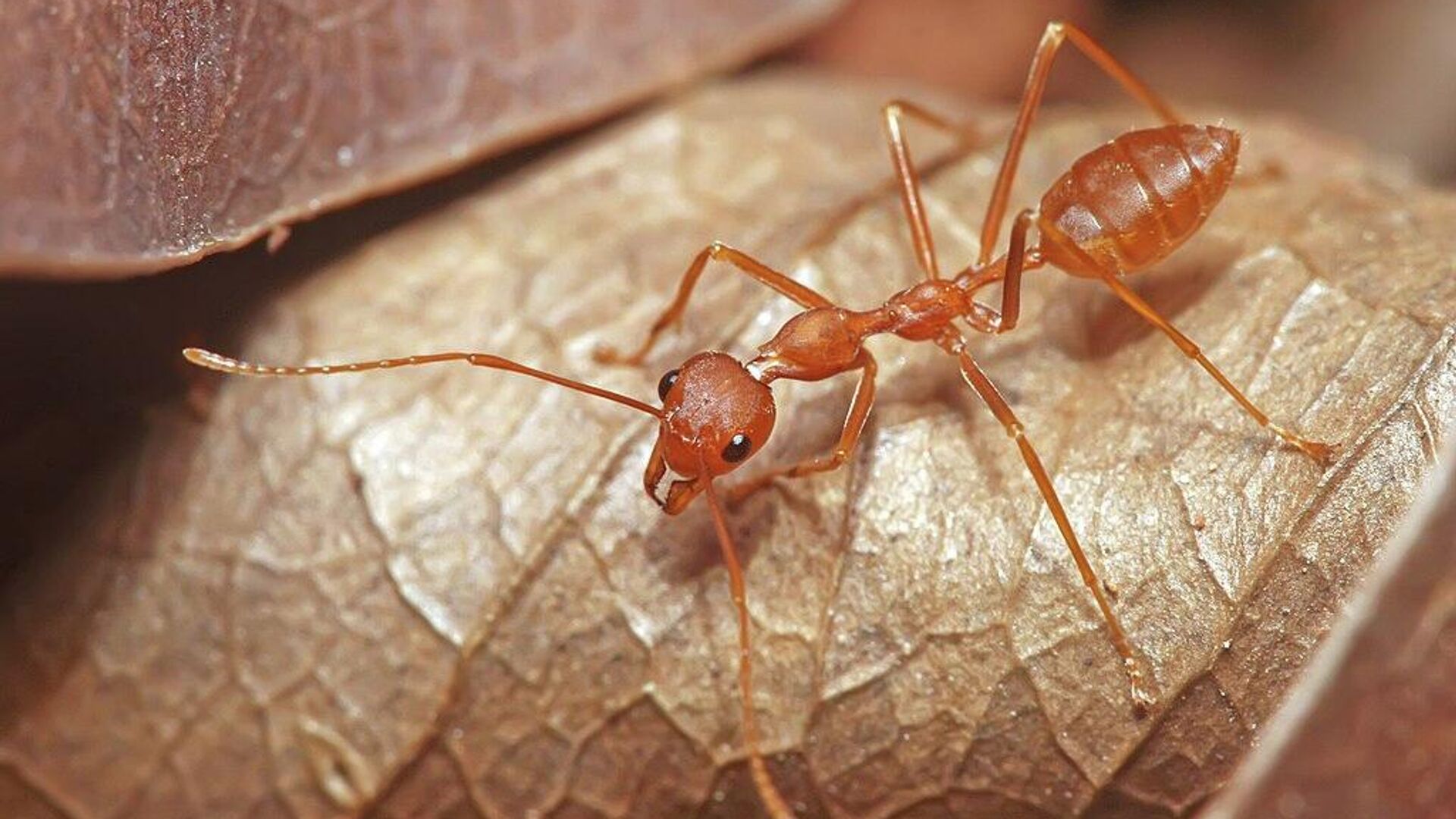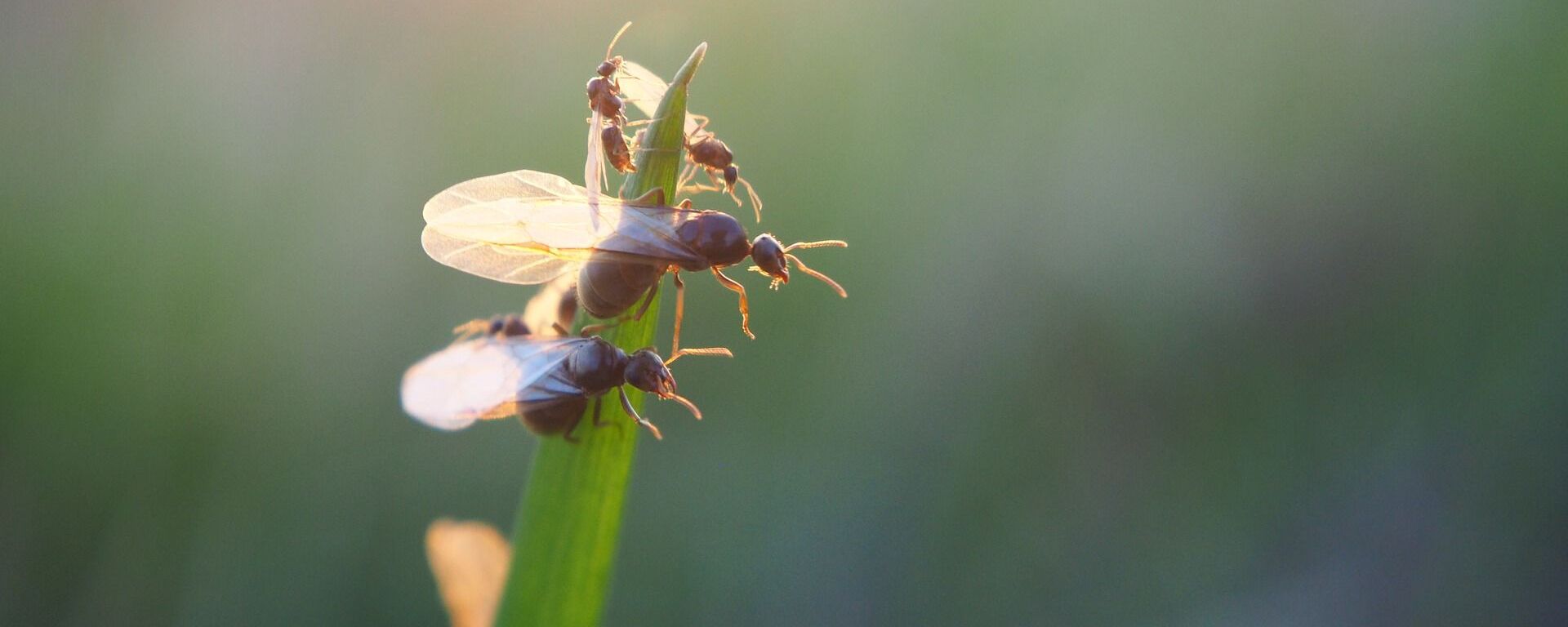https://sputnikglobe.com/20220921/its-an-ants-world-scientists-calculate-that-about-20-quadrillion-ants-are-roaming-our-planet-1101026485.html
It's An Ant's World: Scientists Calculate That About 20 Quadrillion Ants Are Roaming Our Planet
It's An Ant's World: Scientists Calculate That About 20 Quadrillion Ants Are Roaming Our Planet
Sputnik International
A team of scientists claimed in a new scientific report that was released on Monday in the journal PNAS that there are currently 20 quadrillion ants in the... 21.09.2022, Sputnik International
2022-09-21T04:36+0000
2022-09-21T04:36+0000
2022-11-23T13:01+0000
science & tech
biology
biologist
ant
ant group
census
global climate
climate change
https://cdn1.img.sputnikglobe.com/img/07e6/07/05/1096981118_0:54:1025:630_1920x0_80_0_0_56472b09dbde5fb2b0cf560797c9471e.jpg
The team of researchers examined 489 entomological papers from every continent, significant habitat, and biome on Earth to come up with an estimate of all the ants on the globe.The total number of ants, according to the research, is only five times smaller than the total biomass of all humanity on Earth. And it is said to be only a conservative estimate.Each of the 489 global investigations was quite detailed, using tens of hundreds of booby trap techniques to catch ants in small plastic container ditches and count the number of ants on leaves that became dwellings.However, sampling sites were not evenly spread throughout geographical areas, and the majority of samples were taken from the ground layer. But Why?According to the paper, understanding the distribution and abundance of the species is essential to comprehending their ecological significance for other taxa as well as their roles within ecosystems. Insects, who have long been thought of as the "little things that run the world," now lack such information.Given how quickly our environment is changing, there is supposedly a pressing need to count ants explicitly, as the team did. Because climate change, which is a problem aggravated by human activity, is pushing global temperatures to rise and thus placing these organisms at risk of extinction, scientists must estimate the number of ants as well as other animals and insects that live on Earth.Wong emphasized that the team's recent work provides an important baseline for ant populations, so we know how these insects' communities might change in tandem with a warming climate. The term "dark extinction," sometimes known as anonymous extinction, occasionally refers to the worst-case scenario of not totaling up the number of other organisms that make Earth their home. The concern is that, as the climate crisis gets worse, many species may vanish covertly as a result of factors like habitat loss or uninhabitability. Those species that are close to extinction may not even be known, much less thoroughly investigated, per the scientists.In the future, Wong thinks it is crucial to routinely survey ant populations, and entomologists can even speed up the procedure by outsourcing it to everyone who can and wants to take part.Ants are quite little, yet they pack a powerful back.These insects are essential to preserving the delicate balance of our ecosystem, aside from burying seeds in the ground and unintentionally flowering plants from their leftovers. To name just a few of their roles, they are scavengers, predators of numerous other species, soil churners, and prey for larger creatures. They are therefore a pretty huge, and rather old, phenomenon when one considers the vast number of them that walk, or even fly, on Earth.
https://sputnikglobe.com/20191105/cannibal-ants-escape-nuclear-bunker-poland-1077231867.html
https://sputnikglobe.com/20200718/its-not-raining-flying-ants-take-the-sky-in-south-coast-of-london-video-1079921031.html
Sputnik International
feedback@sputniknews.com
+74956456601
MIA „Rosiya Segodnya“
2022
News
en_EN
Sputnik International
feedback@sputniknews.com
+74956456601
MIA „Rosiya Segodnya“
Sputnik International
feedback@sputniknews.com
+74956456601
MIA „Rosiya Segodnya“
science & tech, biology, biologist, ant, ant group, census, global climate, climate change
science & tech, biology, biologist, ant, ant group, census, global climate, climate change
It's An Ant's World: Scientists Calculate That About 20 Quadrillion Ants Are Roaming Our Planet
04:36 GMT 21.09.2022 (Updated: 13:01 GMT 23.11.2022) Kirill Kurevlev
Managing Editor
A team of scientists claimed in a new scientific report that was released on Monday in the journal PNAS that there are currently 20 quadrillion ants in the world. That translates to 20,000,000,000,000,000 of the six-legged insects, thus reaching 20% of the human biomass and exceeding the biomass of all wild mammals and birds put together.
The team of researchers examined 489 entomological papers from every continent, significant habitat, and biome on Earth to come up with an estimate of all the ants on the globe.
"We further estimate that the world's ants collectively constitute about 12 megatons of dry carbon," Mark Wong, an ecologist at the University of Western Australia's School of Biological Sciences is quoted as saying in the
CNET report upon the publication.
The total number of ants, according to the research, is only five times smaller than the total biomass of all humanity on Earth. And it is said to be only a conservative estimate.
Each of the 489 global investigations was quite detailed, using tens of hundreds of booby trap techniques to catch ants in small plastic container ditches and count the number of ants on leaves that became dwellings.
"Ant abundance is distributed unevenly on Earth, peaking in the tropics and varying sixfold among habitats," the team's paper says.
However, sampling sites were not evenly spread throughout geographical areas, and the majority of samples were taken from the ground layer.
"We have very little information about ant numbers in trees or underground," Wong said. This reportedly indicates that the scientists' conclusions are not quite comprehensive.
According to the paper, understanding the distribution and
abundance of the species is essential to comprehending their ecological significance for other taxa as well as their roles within ecosystems. Insects, who have long been thought of as the "little things that run the world," now lack such information.
Given how quickly our environment is changing, there is supposedly a pressing need to count ants explicitly, as the team did. Because climate change, which is a problem aggravated by human activity, is pushing global temperatures to rise and thus placing these organisms at risk of extinction, scientists must estimate the number of ants as well as other animals and insects that live on Earth.

5 November 2019, 19:05 GMT
Wong emphasized that the team's recent work provides an important baseline for ant populations, so we know how these insects' communities might change in tandem with a warming climate.
"We need people to rigorously and repeatedly survey and describe the ecological communities of different habitats before they are lost," he underscored.
The term "dark extinction," sometimes known as anonymous extinction, occasionally refers to the worst-case scenario of not totaling up the number of other organisms that make Earth their home. The concern is that, as the climate crisis gets worse, many species may vanish covertly as a result of factors like habitat loss or uninhabitability.
Those species that are close to extinction may not even be known, much less thoroughly investigated, per the scientists.
In the future, Wong thinks it is crucial to routinely survey ant populations, and entomologists can even speed up the procedure by outsourcing it to everyone who can and wants to take part.
"Things like counting ants," he said, "taking photographs of the insects they encounter in their backyard and noting observations of interesting things that plants and animals are doing can go a long way."
Ants are quite little, yet they pack a powerful back.
These insects are essential to preserving the delicate balance of our ecosystem, aside from burying seeds in the ground and unintentionally flowering plants from their leftovers. To name just a few of their roles, they are scavengers, predators of numerous other species, soil churners, and prey for larger creatures.
They are therefore a pretty huge, and rather old, phenomenon when one considers the vast number of them that walk, or even fly, on Earth.





